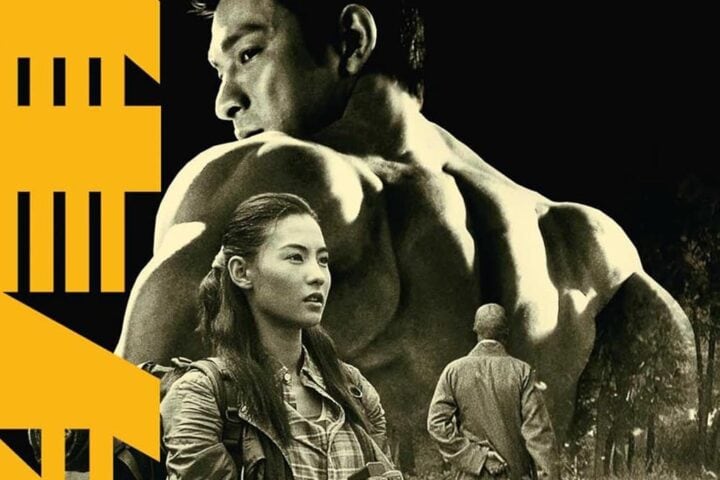Benny Chan’s A Moment of Romance swiftly establishes the narrow perimeter of the world that triad member Wah Dee (Andy Lau) inhabits. Though Dee cuts a profile of louche cool in his denim jackets and sleek motorcycle, the gangster getaway driver moves through the emptiest and least exotic realms of the criminal underworld. His stomping grounds generally consist of rundown buildings and day-rate hotels where he works and sleeps, and his only visible means of letting off steam consists of heading to a nearby quarry to watch a kind of demolition derby with all the other fast-living losers who occupy the bottom rungs of triad life. He treats his bosses with the usual differences demanded by organized crime’s rigid power structures, and they in turn speak to him as little more than an indentured servant.
When one of Dee’s superiors, Trumpet (Wong Kwong-leung), stages a jewelry store robbery, things go awry and the gang scatters, with Dee clearly intended to take the fall. Clueless to this fact, he takes a hostage, an heiress named Jo-Jo (Jacklyn Wu), and uses her to escape capture. When Dee’s compatriots learn of this, they demand that he kill her to leave no witnesses, but he refuses, both out of a natural reluctance to kill and an immediate sense of connection with her.
The remainder of A Moment of Romance oscillates between a star-crossed lovers romance and a gangster thriller. Dee and Jo-Jo’s rapidly blooming love affair brings heat from the woman’s imperious mother (Leung San) even as the two must navigate the more pressing concern of Trumpet punishing his subordinate for failing to be the patsy. Dee’s boss accuses his driver of being a snitch, setting his other underlings loose on the couple.
Chan bridges the gap between two genre extremes by employing aesthetic techniques that can work equally well to opposite tonal ends. The use of slow motion brings the action to a John Woo-like crawl, highlighting the swarm of hoodlums converging on Dee with whatever blunt objects they can find, but it also draws out the longing gazes between Dee and Jo-Jo as they wrestle with the knowledge that they should separate for each other’s safety.
On the flipside, sudden quick cuts add kinetic thrust to each blow landed on the protagonist and a painful sense of time slipping away from the lovers as each moment together never lasts long enough to satisfy them. The nighttime exteriors of Hong Kong glow with neon signs reflecting off of streets perpetually slicked with water, which sets a moody tone equally appropriate for a gutter-level gangster drama and a tale of alienated youths finding mutual solace together.
Released in 1990, A Moment of Romance was by no means an early entry of the Hong Kong New Wave that had been rippling through the province since the mid-1980s. Nonetheless, its blend of genres and moods positioned it at a nexus point for the two wildly divergent paths that the region’s cinema would take during the ’90s. In its kinetic but elegant gangster action are the seeds of Hong Kong’s more mature take on the Heroic Bloodshed movies of the ’80s that would be epitomized by filmmakers such as this movie’s producer, Johnnie To. And in its achingly earnest, existentially longing approach to unguarded romance are ideas that the likes of Wong Kar-wai would develop to new heights. Chan never made another film quite like this, but with it he announced a new chapter in Hong Kong’s rich history of genre cinema.
Image/Sound
Radiance’s Blu-ray transfer comes from a 4K restoration that highlights the film’s expert juxtapositions of drab buildings with the bold colors of store signs and the streaks of red and white that Dee’s motorcycle leaves in its wake as it speeds down streets. Detail is consistently crisp, and grain is distributed evenly. The mono soundtrack deftly handles the occasional eruptions of romantic music and the roar of street noise in A Moment of Romance’s many gang rumbles, and there are no discernible instances of distortion or any other loss of clarity.
Extras
In a new commentary, critic Frank Djeng effusively covers A Moment of Romance’s production and its impact on both the art-house and commercial circuits of the region. Critic David Desser contributes a video essay that zeroes in on the film’s relationship to Hong Kong’s New Wave in terms of the movies that influenced it and the ones that it, in turn, influenced, and a 2016 interview with Benny Chan contains copious information on his memories of making A Moment of Romance. A booklet contains essays by Sean Gilman and Tony Williams that further speaks to the film’s place in Hong Kong cinema and Chan’s career.
Overall
Benny Chan’s influential, tender gangster romance receives a gorgeous transfer and informative extras from Radiance Films.
Since 2001, we've brought you uncompromising, candid takes on the world of film, music, television, video games, theater, and more. Independently owned and operated publications like Slant have been hit hard in recent years, but we’re committed to keeping our content free and accessible—meaning no paywalls or fees.
If you like what we do, please consider subscribing to our Patreon or making a donation.

